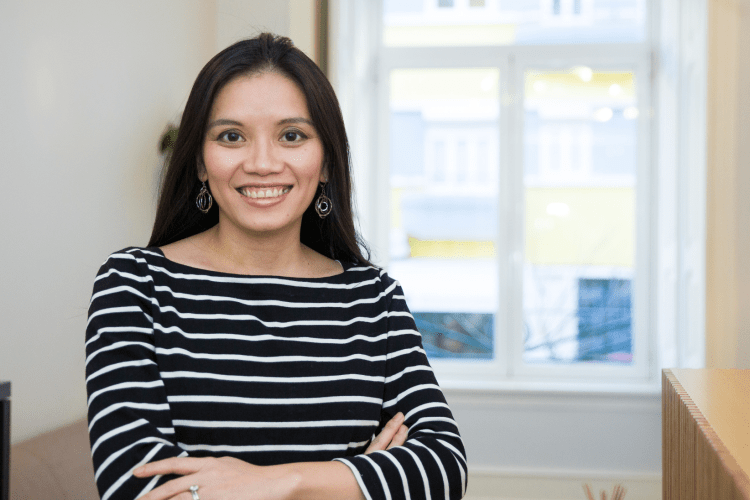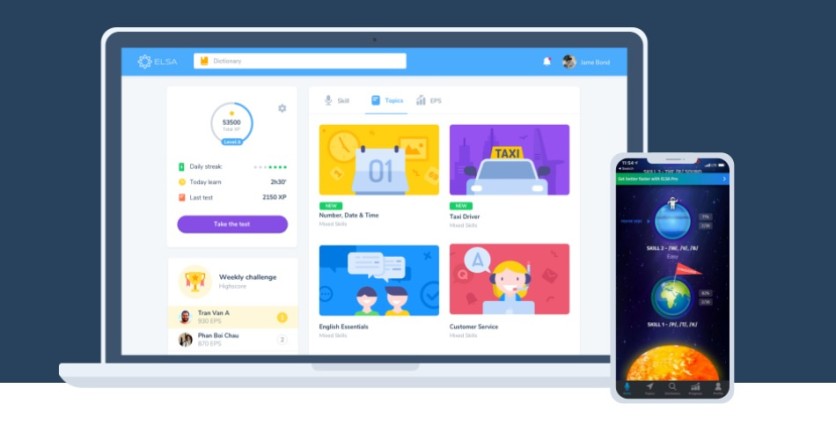Since she founded her English-learning company in 2015, Vietnamese entrepreneur Vu Van struggled to expand her business, English Language Speech Assistant (ELSA), which provides an app powered by artificial intelligence (AI) to help non-English speakers communicate in English clearly and confidently.
Then the coronavirus pandemic shook the world. With the education systems forced to go online due to the health crisis, there has been a rise in demand for e-learning apps and ELSA was one of the apps tapped by schools and universities for their English learning courses. It provides short, app-based lessons to teach English pronunciation and speech. Currently, ELSA already has around 11 million users.

On lacking confidence to speak out
After leaving Vietnam to study in the United States, she stayed there to work. Despite being fluent in English, she was always silent and lacked the confidence to speak out. Mispronunciation concerns held her back from her Stanford MBA class and management consulting work.
Her peers shared the same concerns, and they thought this could also be an issue for others as well. "Others" would mean about 1 billion English non-native English speakers worldwide.
Van then dreamt of setting up a tool that could detect users' broken English accurately while providing solutions that are easy-to-follow. She acknowledged that it is hard to learn perfect American or British accent. "But to speak confidently and fluently so that other people can understand you, that can be fixed," the CEO told CNBC Make It.
Read also : Artificial Intelligence Solved the Puzzle of DNA Activation Code for Identifying 75% of Human Genes
Search for her co-founder to make her visions a reality
With just a vision in her mind, it would be difficult to achieve her goal. She decided to quit her consulting job and searched for a technical co-founder. She spoke with "every AI voice recognition expert in the Bay area."
She was talking to five persons per day, and getting more leads after another until she got a pass to the world's voice recognition technology conference in Germany. She was told by her technical professor that if she still cannot find anybody to her in the conference, "then you might as well shut the company down."

In Germany, Van met top scientist Xavier Anguera among other 3,000 experts. They tested their partnership when he moved in to Van's "tiny" apartment in San Francisco and try to develop their idea. They also made honest and "toughest conversations" on various aspects like salaries, equity splits, and other important matters.
With Anguera as chief technology officer, the two worked on building a prototype using data from non-native English speakers and scaling it off with standard American English. Van went back to Vietnam to train the AI with a huge non-native English population.
In 2016, ELSA won in start-up competition and went viral and had 30,000 users in 24 hours while the team got access to user data worldwide.
On winning Google $3.2 million funding
After six months on solely relying on their own money, ELSA finally had an initial seed investment. Then in 2018, Van and Anguera secured $3.2 million in a funding round from different backers such as Monk's Hill Ventures, a Southeast Asia-focused venture capital fund, which had ELSA as of its first Vietnam investments.
In 2019, Gradient Ventures, Google's funding focused on AI, gave ELSA team access to Google's technical team to further strengthen its backend infrastructure while raising the company's funding to more than $12 million.
ELSA's unique freemium model allows users full access to more than 1,000 courses for just $3 to $6 per month. With the pandemic opening parents' minds on other way of learning, ELSA's users have surged three to four times each month.
"2020 has been a crazy year, but I think we have done well and we're excited for what's in store for 2021," Van told CNBC Make It.
Meanwhile, Van also said that they are exploring more innovations for ELSA, including continuous monitoring in which the app would give feedback based on conversations made by users throughout the day. However, she said they are still weighing how they could do that with still adhering to data privacy laws.
This is owned by Tech Times
Written by CJ Robles




